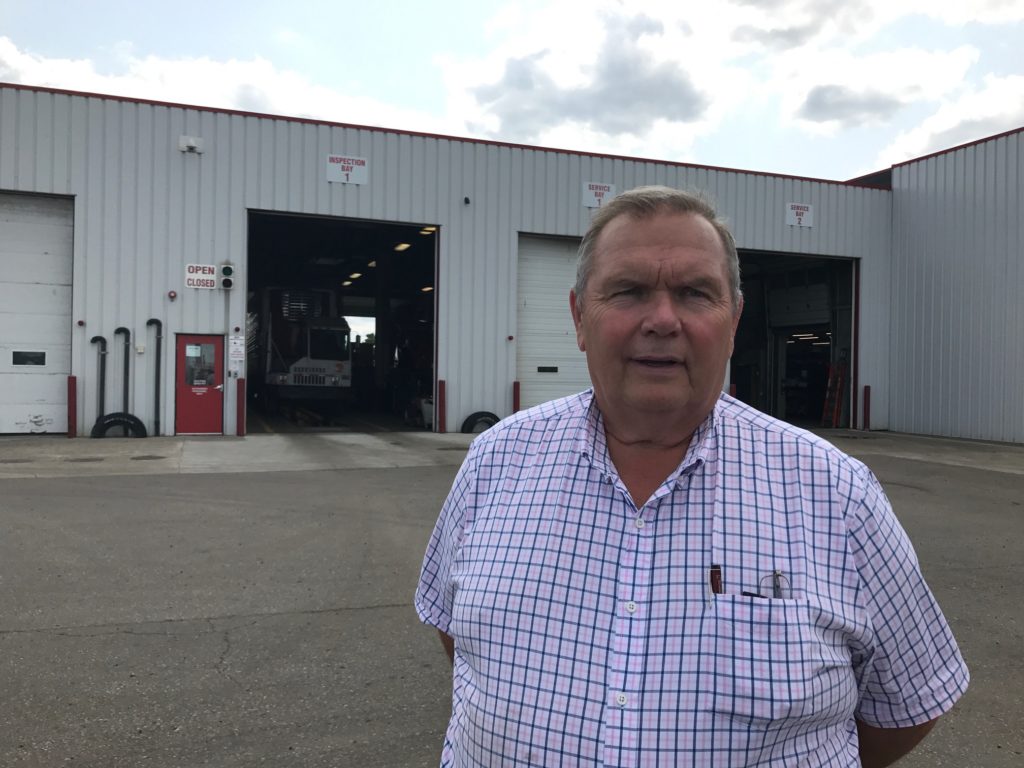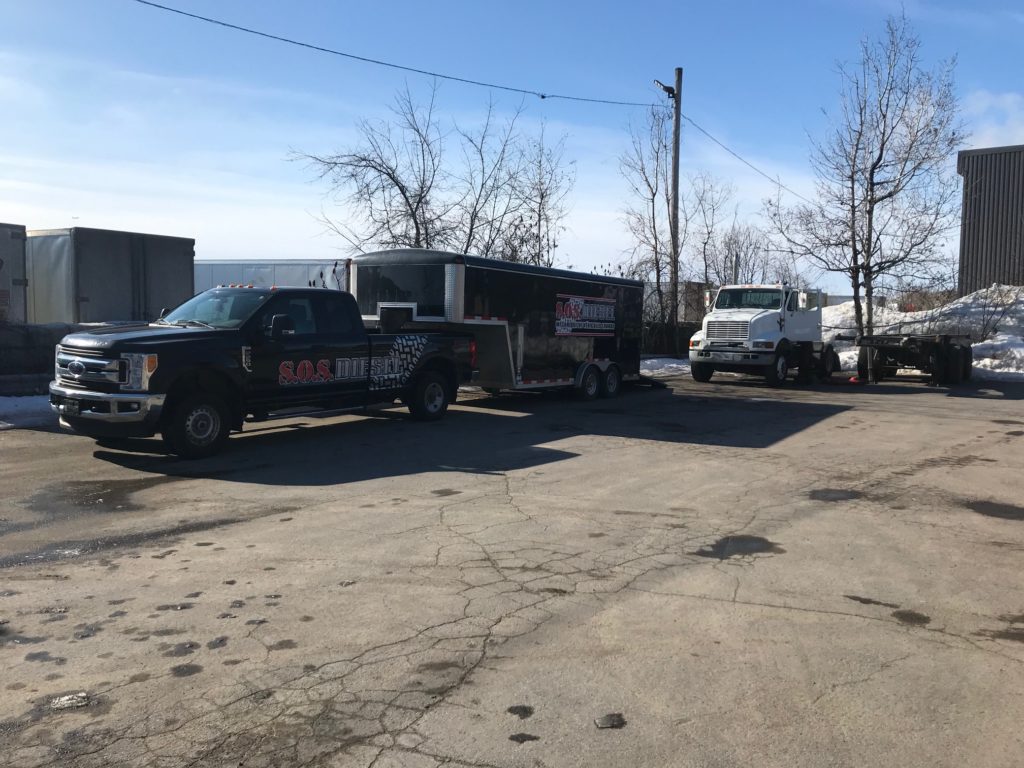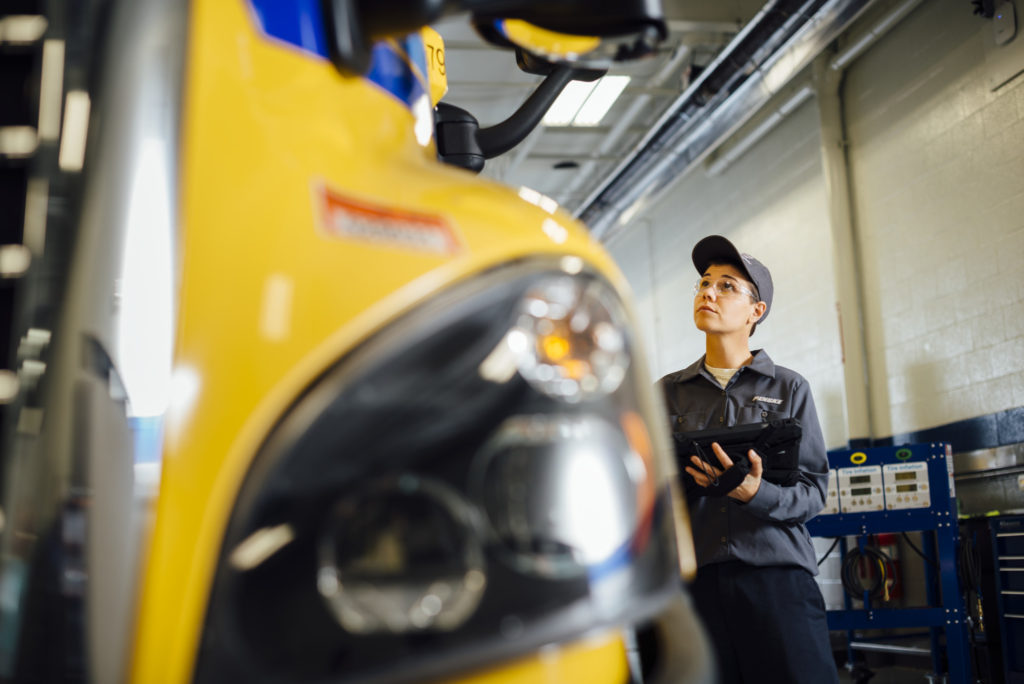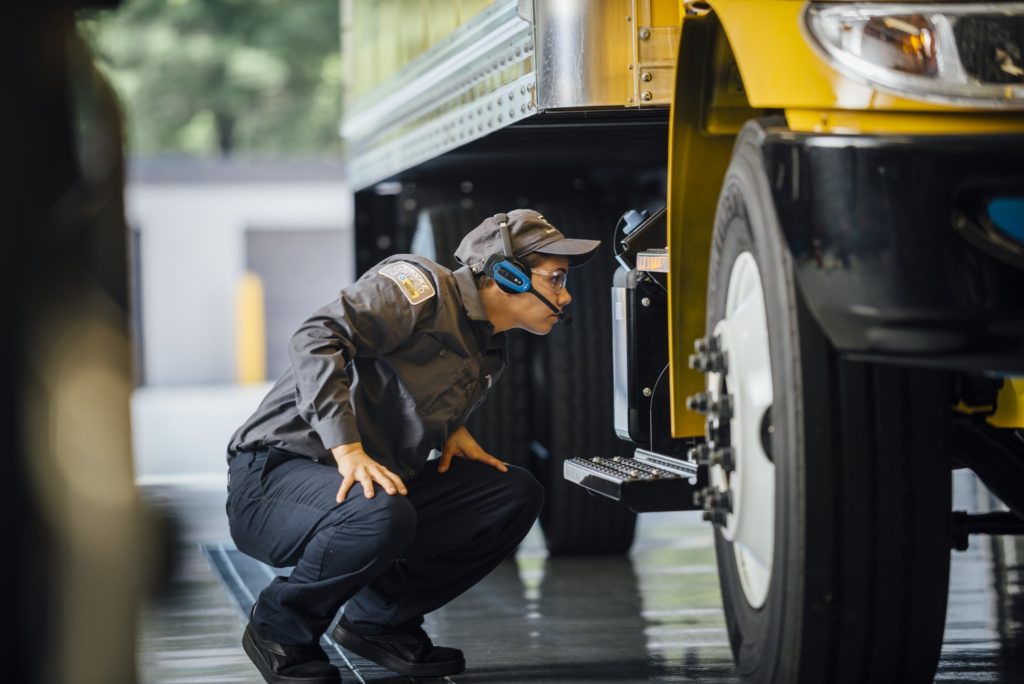Fleet maintenance operations implementing Covid-19 protocols
Every time heavy truck mechanic Mark Washke shows up at work, he worries about contracting Covid-19. From a co-worker who frequently spits on the shop floor, to dirty trucks coming in for service, to having to physically clock in on the same punch clock used by all technicians, he sees ample opportunities for the spread of the virus at the Ontario-based 60-truck fleet where he works.
“The concern and fear of Covid-19 has caused the Erb Group maintenance department to review everything we do, how we do it, why we do it, and if we will continue to do it. Everything.”
Jim Pinder, Erb Group of Companies
He asked us not to name the fleet, but voiced his concerns in an interview with Today’s Trucking. Washke complained about continuing use of the punch clock, but said he was told the company couldn’t afford a new one, and that it must be used to punch in.
“We have to worry about the drivers coming in. Even the parts delivery guys. We don’t know where they’ve been,” Washke said.
At Erb Group, it’s far from business as usual in the shop.

“The concern and fear of Covid-19 has caused the Erb Group maintenance department to review everything we do, how we do it, why we do it, and if we will continue to do it. Everything,” emphasized Jim Pinder, corporate fleet director, Erb Group of Companies. “Our focus is to complete as much of the service, maintenance and repairs at an Erb facility where we have control of the shop environment. We have staff sanitizing and cleaning as they go, constantly.”
A third-party cleaning service has been instructed to heighten its cleaning practices and technicians and drivers have been equipped with sanitizers and other cleaning products, used whenever entering or exiting vehicles.
While Erb has opted to bring as much work as possible in house, for better control, the opposite seems to be true in Quebec, where many fleets are laying off technicians, downsizing their internal maintenance operations, and outsourcing more work. That’s the observation of Reggie Masse, sales and marketing director with mobile repair service SOS Diesel. He says business is up by about 50% since the Covid-19 outbreak.
Increased demand for mobile units
The company operates 14 mobile repair units out of Montreal, and another three in Quebec City.
SOS has had to juggle scheduled preventive maintenance operations at customer facilities with skyrocketing roadside service calls.
“Some of the top 100 companies are letting go mechanics in their own shops and coming to us for work,” Masse told Today’s Trucking, adding many fleets are also parking their own mobile service units.

SOS Diesel has instituted new policies to protect customers and its own mechanics from contracting the virus.
“We are always wearing gloves and putting masks on,” Masse said. “We give our mechanics black plastic gloves and say ‘You wear this no matter what you’re touching.’”
Customers are instructed to keep six to seven feet from the mechanics who are servicing their vehicles. With business booming, SOS is preparing to deploy its 18th service truck and is hiring more mechanics.
Dealers adapt
Many dealerships have also put into place additional processes to protect employees and customers, alike.
At Diamond Group’s International dealers, technicians sanitize all touch points, including: the parking brake; steering wheel; seatbelt; gearshift; door latch; and any other common points of contact.

Penske Truck Leasing has also adapted to the health crisis, with additional precautions and protocols.
“Customers should be aware that we have made some changes to our service procedures,” noted Gregg Mangione, senior vice-president of maintenance with Penske Truck Leasing. The full list can be seen here, but it includes steps such as calling ahead to ensure the required service is still offered, parking in designated areas, and sanitizing all touch points.
“Staff education is key,” said Mangione. “We have been doing a lot to make our techs and other associates aware of symptoms, taking personal steps to self-monitor and providing support if and when it’s needed.”
Penske has also staggered PM schedules to limit the number of drivers and technicians in the shop, increased routine cleaning and sanitization of shop and vehicle touch points, provided technicians with personal protective equipment, and deployed a rapid response team for when deep cleaning is required.
“This week, following new guidance from The Centers for Disease Control, we strongly recommend that our associates wear face coverings in the workplace,” Mangione told us in early April. “Penske has ordered a supply of protective face masks to assist all associates who are physically reporting to work.”

While there were initially some supply shortages and delays, Mangione said Penske has been able to procure the cleaning supplies it needs.
Back at Erb Group, communication continues to be key. The information flow began in early March, Pinder recalled, with hourly staff updates through verbal and written communications. Today, written updates are posted throughout the shop daily. Barriers have been put in place to enforce social distancing, and shop leaders are leading by example, Pinder said.
The company has also heightened security at its shops, terminals and cold storage facilities to limit visitors.
“We are stopping or reducing third-party or personal vehicles from accessing Erb property and those who are allowed are completing a health survey in advance,” Pinder noted. “The same process is required for shop service providers to complete a health survey if they require access inside a shop, shop office or parts area.”
Erb has also reduced parts order frequency and the number of vendors it relies on, and “we request external and internal paper movement to be done electronically to reduce the paper transfer between individuals, departments and service providers.”
Have your say
This is a moderated forum. Comments will no longer be published unless they are accompanied by a first and last name and a verifiable email address. (Today's Trucking will not publish or share the email address.) Profane language and content deemed to be libelous, racist, or threatening in nature will not be published under any circumstances.
This is widespread.
Fleets are more driver centered.
Mr. Pinder may be an exception but I am curious how the Mississauga maintenance shop compares to head office maintenance shop.
It left things to be desired in the 90’s
Maybe it has changed.
But still other fleets have no issue letting driver’s hang around the shop area, around Technicians even before this virus.
No change now.
I sure hope Mark is able to stay safe.
Even other Technicians do not care about Social Distancing.
As for Arden.
If you don’t mind people standing behind you acting like fools then you are a better person than I.
As for trucks.
Since the fleets are driver centered the drivers are not required to maintain the cleanliness of their cabs. Technicians are forced to put up with a true GARBAGE dump. Or walk. One way to avoid having to repair a truck is if you are understaffed.
Virus or no Virus.
There is no change in Sanitary Enviroments of a maintenance shop.
Now there are GREAT shops out there and they deserve to be commended.
But they are not that large in number.
Thank you for letting me ramble
It seems to me that employees are looking for an excuse not to work and would rather stay home and collect unemployment. I’m sure if these “tech’s” would follow the hand washing protocols and as I have seen the past number of years – wear their black rubber gloves – there isn’t any more risk to being infected than any other job except for care givers in direct contact with infected patients.
Cmon guys – grow a pair and get to work!
I’m out here driving more than ever – washing my hands after every possible new contact I encounter.
Wat right – go outside and get some fresh air and get plenty of sleep. Keep your body in tip top fighting shape and I’m pretty sure you have a very good chance of surviving the coronavirus challenge we are now facing.
Personally – if a truck was a royal pig pen – I would not sit or work on it either – coronavirus or not.
Stay safe people and remember – this too shall pass!!